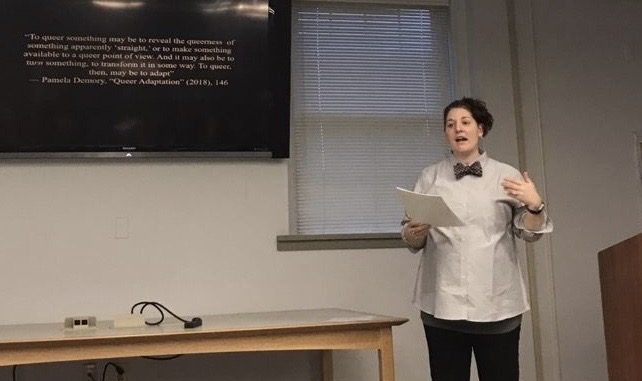
The evolution of society is reflected predominantly in art, especially drama.
In their lecture, “Am I Home?: Dyke Dramas and Queer Feminist Domesticity” Women’s, Gender and Sexuality professor Janet Werther examined adaptations of famous dramas through a queer perspective.
First, to provide appropriate context for further and deeper understanding, Werther defined a few imperative words.
They emphasized the power in the word “dyke.” They said that the word “dyke” is more capacious than “lesbian” and more specific than “queer.” Thus, using the word dyke is more inclusive to the many variations of sexual and gender identities.
A utopia is no place; it is not possible to achieve a utopian society in real life. However, society can constantly work further toward a more perfect society, especially as it pertains to queerness.
Werther defines “heterotopia” as a concrete thing that one can experience but something that is contingent, temporary and liminal. Society cannot stay in a heterotopia, but heterotopias can exist in theatre.
Finally, Werther defines “home” as a space for intimacy and family, but a concept that can be both real and abstract.
“O Earth” is a queer adaptation of the play “Our Town,” wherein the classic tale of a queer person leaves a small town to a big city in order to find more people like them. The Editor-in-Chief of theaterscene.net Victor Gluck writes that “O Earth” uses “the original structure of the Wilder play [“Our Town”] (love, marriage, death) and adding gay, lesbian, transgender and Black characters, both historical and contemporary, the play asks how far we have come in 2016.”
Werther claimed that queer adaptations of plays such as “O Earth” want to discover what’s going on with the queer, trans rights movement. Moreover, these adaptations reflect the house and home and how the relationship therein can vary, change and put individuals at a disadvantage because of their gender, sexual orientation, race or residence.
Plays like “O Earth” are imperative in documenting how society understands, represents and interacts with queer people, and therefore their rights, equality and equity. Werther asserted that creating an equitable future for all queer people is only possible if society as a whole rejects traditional institutions of marriage.
Werther then posed these inquisitive questions: can home be reconstructed ethically for queer feminists? Is it possible to re-create home queerly without reinforcing toxic structures or violence? In an attempt to answer these questions, Werther examined theatrical performance.
They look at song and how coming out is represented through them as well as the socio-political messages that they connotate. Moreover, they look at the writing in dyke dramas and the embodiment of queerness in dance.
This lecture was a chapter from Werther’s dissertation and in addition to studying these aspects of queerness, gender and sexuality as it pertains to art, they also observe and research how spaces that dyke dramas and experimental dance occur in impact storytelling.
When asked how they became interested in the queer topic of home, Werther said that they looked intrinsically and did “mesearch.”
Looking at representation in live performance can provide pause and hope. They studied their own experience and how drama and society can create space for queer people. Their research also explores the institutions of marriage, and queer life beyond the marriage statement: marriage is not the be all and end all of queer rights.

